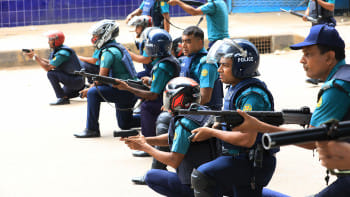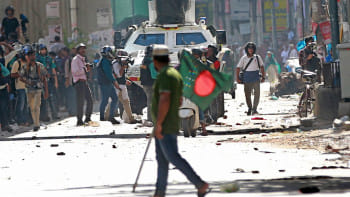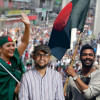Govt risks further alienation as the outrage cycle resumes

We fail to comprehend what the government wants to achieve through its continued crackdown on protesters, which has seen at least 10,947 individuals arrested in 674 cases filed in Dhaka and 51 other districts between July 18 and August 1. Is it really to establish accountability for the violent events of July 18-21? Is it to buttress its narrative around BNP-Jamaat orchestrating the unrest? Is it to punish students, activists, and anyone who dared to stand up against its security forces and party cadres? Is it to disabuse citizens of the notion that those security forces—including police and BGB—were to blame for the killing of over 200 people? Or is it simply an attempt, ludicrous as it may be, to force-restore public order?
Whatever it is, it is not working. It is not the right way. And it is backfiring, in spectacular fashion. On Friday, predictably enough, the public outrage cycle has begun again, with protesters taking to the streets across the country to demand justice for their fallen compatriots, including many students, about two weeks ago. And as before, security forces, aided by party cadres, again violently responded to it, leading to two more deaths and many injuries. How long this cycle will continue depends on how long the government can ignore the already-unprecedented human toll of this movement.
Ever since the first wave of violence, the government's law enforcement focus has been mainly twofold: conduct raids and arrests for the July 18-21 events, and suppress public outbursts at the killings. If we are to stick to the legal measures taken by the law enforcers so far, many disturbing trends about their arrests and case filings have also come to light. From conducting "block raids" to abducting six key coordinators of quota reform protests to bringing trumped-up charges against listed political rivals to inflating the age of minors implicated in cases to falsifying First Information Reports (FIR) to grossly violating Supreme Court guidelines for arrests and remand to allegedly engaging in "arrest business"—the list of objectionables reported in the media is quite long.
All this runs in the face of claims by the home minister and other top officials that the arrests are being made "based on evidence," and not as part of any mass arrest campaign. We have earlier commented on how the mass arrests and block raids, often targeting students involved in quota reform protests, have created widespread panic among ordinary citizens. Add to that the legal hassles and the uncertainty they bring in victims' families. This will no doubt add to the overall climate of anger and distrust, further alienating the government.
Against this backdrop, it is no wonder that the recent change in government tone—as evidenced by the slowdown in lamentation for destroyed public infrastructure, finally acknowledging the catastrophic tragedy that accompanied it, and signalling openness to international cooperation in investigations—is seen suspiciously by many protesters out there, and for that, the ongoing crackdown and arbitrary detentions are largely responsible. The question is, when will the government understand that no amount of rhetoric or theatrics can deflect attention from the overarching need for justice preceded by a credible investigation?
Restoring public trust, and indeed order, cannot begin without an honest endeavour. The wounds from those days of reckless firing cannot be healed by reckless arresting, which will only make things worse. If the government really wants the public to trust in its sincerity to conduct a fair and thorough investigation into the July tragedy, it must stop these law enforcement excesses and make way for an independent probe of international standards. It must bring the light on the role of its own security forces in the killings.


 For all latest news, follow The Daily Star's Google News channel.
For all latest news, follow The Daily Star's Google News channel. 












Comments